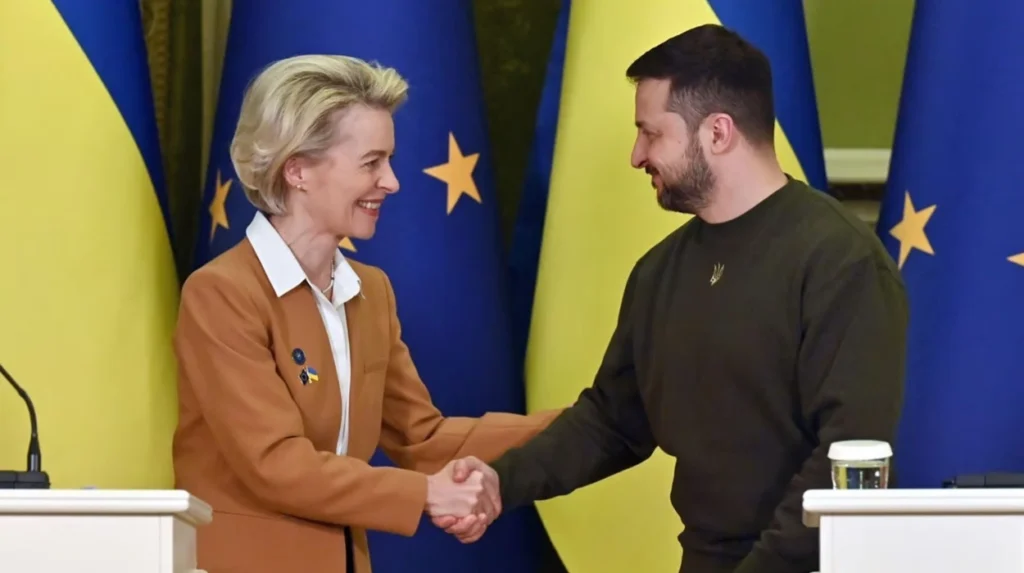The European Union is considering an additional €100 billion aid package to support Ukraine’s economy and military amid the ongoing conflict with Russia. However, rising concerns about Ukraine’s escalating debt and persistent corruption have prompted the EU to condition the aid on strict reforms and transparency measures. This financial assistance aims to address Ukraine’s severe humanitarian and economic challenges while reinforcing its sovereignty. The EU’s move also carries significant geopolitical implications, signalling strong support for Ukraine and impacting regional stability. Negotiations between the EU and Ukraine will focus on ensuring accountability and effective use of funds to maximise the aid’s impact.
European Union’s new financial proposal for Ukraine
The European Union is contemplating an additional financial aid package worth €100 billion to support Ukraine, as reported by various international news outlets. This substantial sum is intended to bolster Ukraine’s economy and military capabilities amidst the ongoing conflict with Russia. The proposal reflects the EU’s continued commitment to Ukraine’s sovereignty and stability in the face of mounting challenges.
Cncern about Ukraine’s debt and corruption
Despite the EU’s willingness to provide further aid, there are significant concerns regarding Ukraine’s escalating debt levels and persistent corruption. Analysts and policymakers within the EU have voiced worries that without stringent oversight and reforms, the financial support might not yield the intended benefits. The corruption issues have historically undermined Ukraine’s economic progress and governance, raising questions about the effective utilisation of the new funds.
EU plan to address these concerns
The EU has emphasised that any additional financial assistance will be conditional on Ukraine implementing reforms aimed at improving transparency and reducing corruption. This approach is designed to ensure that the aid contributes directly to stabilising Ukraine’s economy and supporting its defence efforts. The EU’s stance reflects a balancing act between providing urgent support and promoting long-term institutional improvements.
Current situation in Ukraine that necessitates this aid
Ukraine continues to grapple with a severe humanitarian crisis, economic instability, and ongoing military conflict. The war has devastated infrastructure, displaced millions, and strained public services. The European Union’s proposed aid package seeks to alleviate these pressures by providing financial resources to sustain government functions, rebuild critical infrastructure, and support military operations.
Broader geopolitical implications of the EU’s aid to Ukraine
The EU’s decision to extend a significant financial package to Ukraine occurs within a complex geopolitical context. It signals strong support for Ukraine against Russian aggression, which has implications for EU-Russia relations and regional security. The move also reflects the EU’s strategic interest in maintaining stability in Eastern Europe and upholding international law.
International organisations’ response to Ukraine’s crisis
Beyond the EU, the United Nations and other international bodies have been actively involved in addressing the humanitarian and political dimensions of the Ukraine conflict. For instance, the UN refugee agency has been assisting in repairing homes and providing aid to displaced persons. However, challenges such as sanctions, political tensions, and regional instability continue to complicate relief efforts.
What are the next steps for the EU and Ukraine regarding this aid?
The EU is expected to engage in detailed negotiations with Ukrainian authorities to finalise the terms of the aid package. These discussions will focus on the conditions attached to the funding, mechanisms for monitoring and accountability, and timelines for implementation. Ukrainian officials have expressed gratitude for international support but acknowledge the need to address internal reforms to maximise the aid’s impact.
This development marks a critical juncture in the EU-Ukraine relationship, highlighting the intersection of humanitarian urgency, economic necessity, and political accountability. The proposed €100 billion aid package underscores the EU’s strategic commitment to Ukraine’s resilience while navigating the complexities of debt management and corruption reform. As the situation evolves, the international community will be closely watching how these financial and political dynamics unfold.







